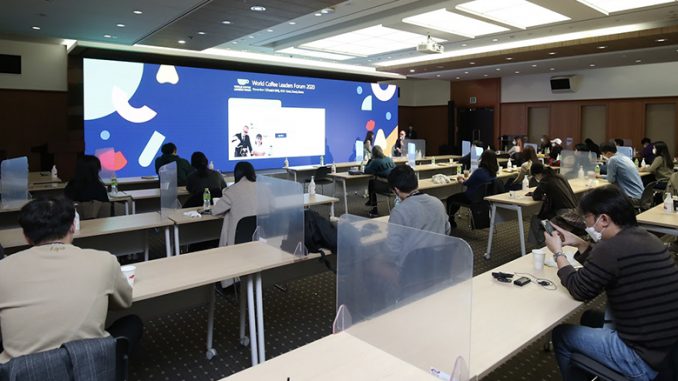
Cafe Show Seoul and World Coffee Leaders Forum hosted their annual event in Seoul, South Korea, with strict safety protocols and great coffee.
BY SUNGHEE TARK
BARISTA MAGAZINE ONLINE
Photos provided by World Coffee Leaders Forum
World Coffee Leaders Forum—now in its ninth year—opened its doors in Seoul, South Korea between November 3-6 during Cafe Show Seoul.
WCLF 2020 had sessions in their plan to discuss “Life After COVID-19” during their flagship global and domestic-centered professional sessions. They hosted technical workshops such as roasting quality control and brewing techniques, as well as planning and launching F&B brands in South Korea.
WCLF 2020 also partnered with Specialty Coffee Association (SCA) this year to host the Sensory Forum, in which they utilized a hybrid of video and in-person formats to invite thought leaders like Fabiana Carvalho, Mario Fernandez, and Professor Norbert Wilson virtually to learn about their research. Sunny Yoon, a director of CBSC International and a World Coffee Events sensory judge, hosted the session.
World Coffee Leaders Forum’s flagship Global Session was also a hybrid this year, with Yannis Apostolopoulos, the CEO of the SCA, and José Sette, the executive director of International Coffee Organization, tuning in virtually. Meanwhile, BK Kim of Fritz Coffee Company in South Korea attended the talk in person, along with myself on behalf of Bean Voyage.
The global session was divided into three parts—COVID-19’s impacts on producing countries, its impact on consuming countries as a whole, and its impact on the changing café design and hospitality in South Korea.
The first session started with José Sette of ICO presenting data and insights on what has been going on in coffee-producing countries since COVID-19, and predictions moving forward. He shared that the ongoing crisis in the coffee industry is not only COVID-19-specific, but that the current crisis exposes the challenges that we have been facing such as the coffee price crisis. Responding to COVID-19, Sette emphasized the importance of the P.P.P. approach: Protect lives, Protect livelihoods & income, and Protect previous investments in sustainable supply chains.
At the event, José also shared the news about the imminent publication of Coffee Development Report 2020, which will share data on trends in the coffee sector, including product upgrading (de-commodification of green coffee) and functional upgrading (processing green coffee to roasted/soluble), plus the structural challenges in the global value chain.
The second session was by Yannis Apostolopoulos of SCA, who explained the data from consuming countries. The study done by SCA and Square in March/April 2020 shared the significant increase in curbside and pickup purchases, along with a general increase in delivery sales by card payments, and the quantity of sales at a given time. Yannis also shared data from the South Korean market gathered in mid-May, where 50% of the respondents were retailers. The data reported businesses experiencing a significant decrease in consumer demand, and some reporting material and supply shortages in coffee.
Yannis’ report highlighted the general sentiment shared across the consuming countries, where sourcing green coffee has been a concern. He also noted that some of the short-term and long-term effects of COVID-19 may include channel shifting (from foodservice to retail) and stockpiling, as well as a rise of at-home consumption.
The last session was a conversation with BK Kim of Fritz Coffee Company and myself. Hosted in-person with both speakers present, we discussed the changing café design and hospitality landscape since COVID-19 in South Korea. BK shared that due to policy recommendations, Fritz had to rethink the spatial design to minimize exposure and contamination at their cafés. This included narrowing the pathway, driving everyone to move in a certain direction, and placing an automatic temperature checker and QR code scanner at the entrance. Kim was also encouraged to design signage and graphics to comfort visitors, but also to assure that care was given to maintain the space safely. Moreover, Fritz experienced an increase in online sales and other virtual collaborations thanks to its online presence.
The audience’s questions addressed issues such as the impact of COVID-19 on the green-bean purchasing model for Korean businesses, and the growing online presence for their cafés and roastery while consumer behavior changes.
Tune in later this week for an interview with BK Kim further about Fritz Coffee Company and its response to COVID-19.

ABOUT THE AUTHOR
Sunghee Tark is the co-founder of Bean Voyage, a feminist organization that collaborates with smallholder womxn coffee producers to build an equitable coffee value chain. She is also a freelance coffee writer, SCA LEAD Scholar, and Re:co Fellow.

